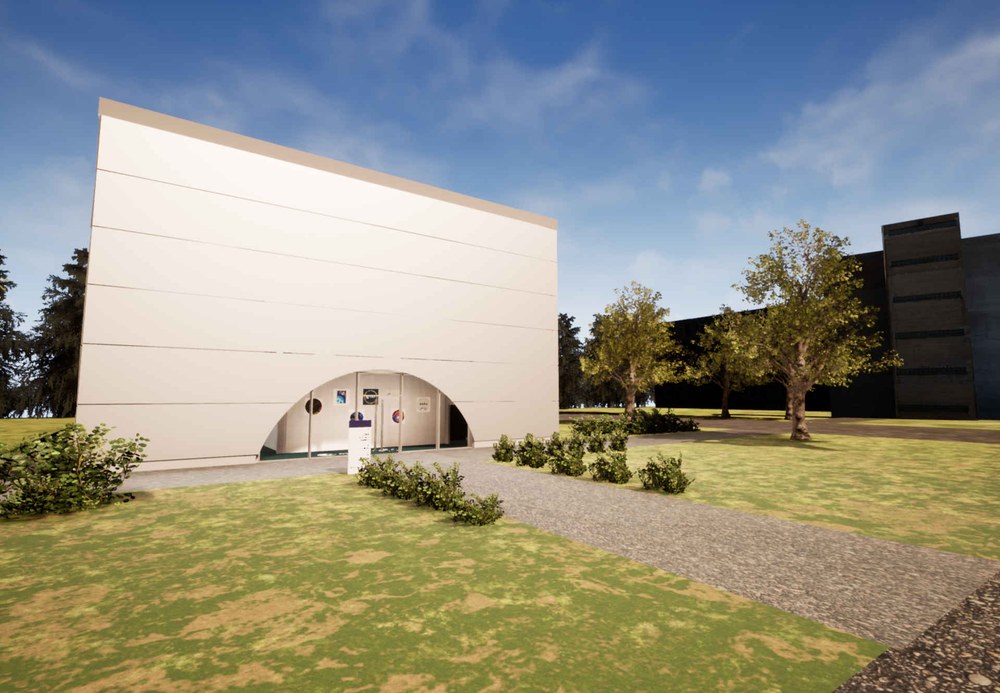EDEN ISS greenhouse returns to Bremen and has a new destination
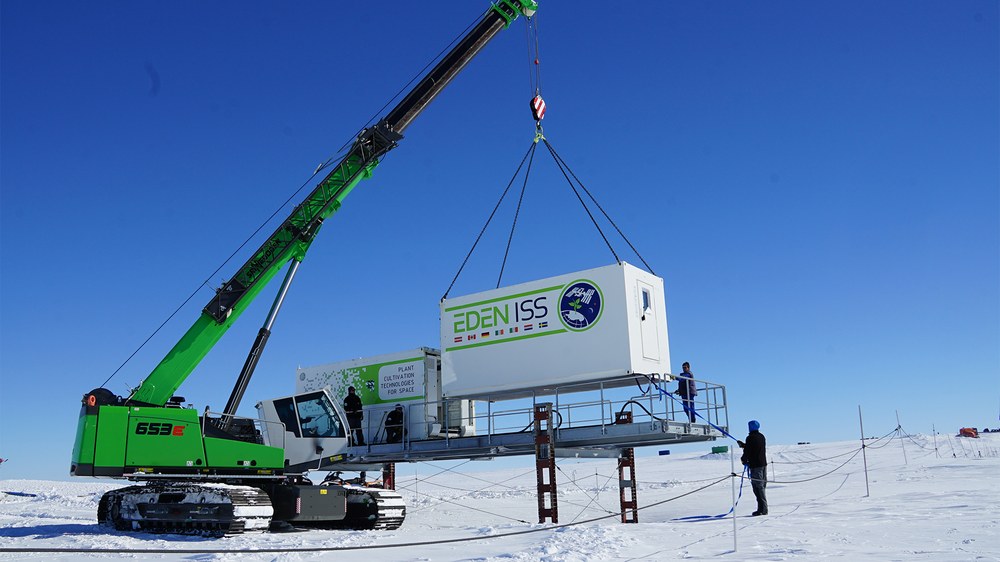

Michael Trautmann
- More than one tonne of vegetables, salad ingredients and herbs harvested in Antarctica.
- Plant cultivation positively impacts the mental and physical well-being of crews on remote missions.
- Potential savings identified during the mission that could reduce the time needed to keep such a greenhouse in operation by 40 percent.
- The experimental greenhouse will now be transformed into EDEN LUNA, a facility for training future lunar astronauts.
- Focus: Space, food supply of the future
The German Aerospace Center (Deutsches Zentrum für Luft- und Raumfahrt; DLR) EDEN ISS Antarctic greenhouse is back in Bremen after spending five years on the seventh continent amid ice, cold and polar nights. The greenhouse has carried out numerous plantings, with harvests totalling approximately one tonne of fresh vegetables for research, to supply the overwintering crews of Neumayer Station III that is operated by the Alfred Wegener Institute (AWI). With its return, the EDEN ISS project comes to an end, leaving behind a wealth of experience on efficient, high-yield operations in isolation. Now, at the DLR Institute of Space Systems, work is beginning on repair, expansion and renewal for a second major test run with a view to the imminent return of humans to the Moon. The largest experimental greenhouse for vegetable cultivation in space constructed to date will be used for training prospective lunar astronauts.
"Over the past few years, the EDEN ISS greenhouse has demonstrated in Antarctica how plant cultivation on the Moon and Mars might look and function using artificial light. But the project also showed how fresh vegetables can be supplied to climatically challenging regions of our planet while using resources efficiently," says Anke Pagels-Kerp, DLR Divisional Board Member for Space. "We now want to make targeted use of this valuable experience. In the coming months, the EDEN ISS greenhouse will be transformed into EDEN LUNA as part of a planned conversion. Astronauts will be able to train in the cultivation of vegetables, salad ingredients and herbs, as well as in the technology and procedures behind this, integrated into the LUNA test and training facility planned jointly by DLR and ESA in Cologne."
Since the beginning of 2018, the EDEN ISS greenhouse operated by DLR has been located in Antarctica, just 400 metres from the German Antarctic station Neumayer III. This was the most extensive long-term test to date of the largest experimental greenhouse for the envisaged food production on the Moon and Mars. A test greenhouse that, as a closed system, enables harvests that are independent of weather, sunlight and seasons, as well as reduced water consumption and the elimination of pesticides and insecticides. During the tests, the researchers were able to acquire a wide range of experience, in particular how highly integrated cultivation systems function under extreme conditions, how human workflows can be integrated in an optimised and time-saving way, and how existing resources can used in an ideal manner. They also learned how the microbiology is affected during growing and harvesting, and how the cultivation and supply of fresh vegetables impacts the well-being of the isolated crew during overwintering.
Optimised processes, reduced working time
"With the greenhouse trial in Antarctica, we have seen a significant learning curve. At the start of operations we needed approximately three hours of human support per day for maintenance and plant care. Over the course of the project, we were able to identify various potential savings that will allow future astronauts to eliminate 40 percent of the time needed to keep such a greenhouse in operation. This is valuable time that they will be able to spend on other activities," explains Daniel Schubert from the DLR Institute of Space Systems. "In addition, the positive effect on well-being from working with plants in harsh environments and isolation was also evident. We are already working on further ideas and concepts for how we can use the unique research environment of Antarctica with the experiences from EDEN ISS for space research," Schubert continues.
One tonne of vegetables, salad ingredients and herbs
In total, EDEN ISS had four growing campaigns, with one season in which the greenhouse was first prepared and then put into a dormant phase in order to start and operate it remotely. Over the entire period, over one tonne (1014 kilograms) of fresh vegetables, salad ingredients and herbs were harvested. Salad ingredients, herbs, cucumbers and tomatoes grew successfully in the greenhouse from the very first season, as did radishes and kohlrabi. Peppers posed a particular challenge. After some modifications and a new choice of varieties, a satisfactory harvest was also achieved for these during each of the last two greenhouse years.
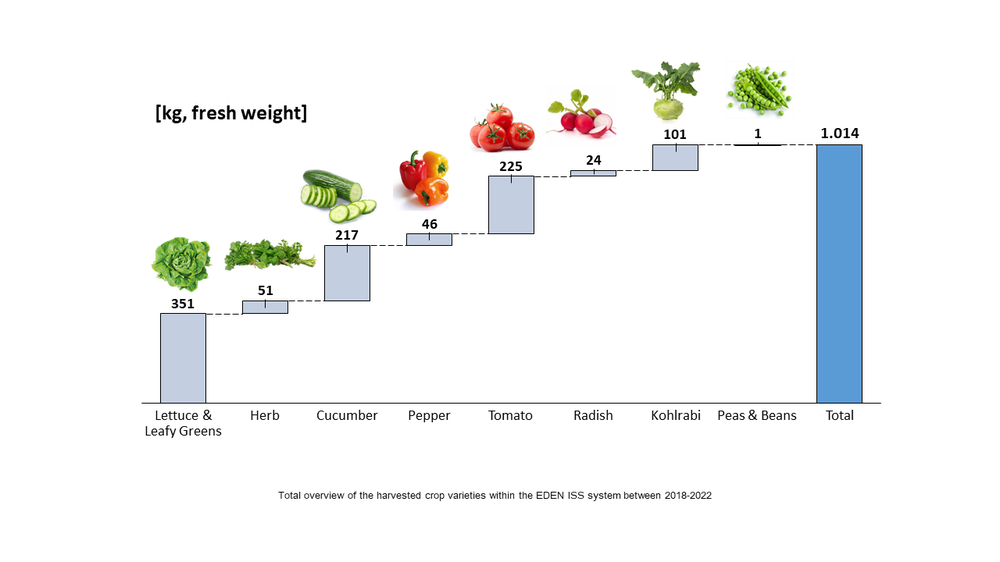
Most recently, NASA guest scientist Jess Bunchek shaped research in the EDEN ISS greenhouse with her overwintering mission, from which she returned in spring 2022. During her mission, she achieved record yields of tomatoes (92 kilograms) and cucumbers (76 kilograms). She was also able to harvest 19 kilograms of peppers. Equally important was the extensive data on the performance and resilience of the greenhouse system, the health and productivity of the plants, their environment and microbiology, on the food safety, nutrition and psychology of the crew, and on the resources needed, such as electricity and water, as well as the working time required. One of the studies she conducted looked at the psychological impact of fresh fruit and vegetables and being able to look at and touch plants.
"During my time in Antarctica, it became clear that the wintering crew enjoys working in the greenery of the plants and, after long exhausting days, eating refreshing meals from the greenhouse, which are also healthy, very tasty and suitable for consumption without any risk of disease. This can also be observed directly in spaceflight with astronaut crews with similar even smaller experiments,'' Bunchek explains. "For the future, this means that crews on remote missions should have the opportunity to cultivate their own plants to strengthen their mental and physical health."
In the course of her overwintering mission, Bunchek was also able to grow various plants and fruits, some of which have already been cultivated on the International Space Station ISS, including different types of mustard and salad ingredients. The 'Española Improved' chilli pepper added spice and vitamin C to the menu during Bunchek's mission to Antarctica. In addition to the particularly high-yielding tomatoes and cucumbers, Bunchek grew beans, peas, leafy vegetables, watercress, rocket, broccoli, cauliflower, chard, spinach, kohlrabi, pak choi and radishes. She also grew multiple varieties of herbs, including mint, basil, parsley, chives, rosemary, thyme and oregano. After her time in Antarctica, she devoted herself to evaluating her experiments. She now works at the DLR Institute of Space Systems in Bremen.
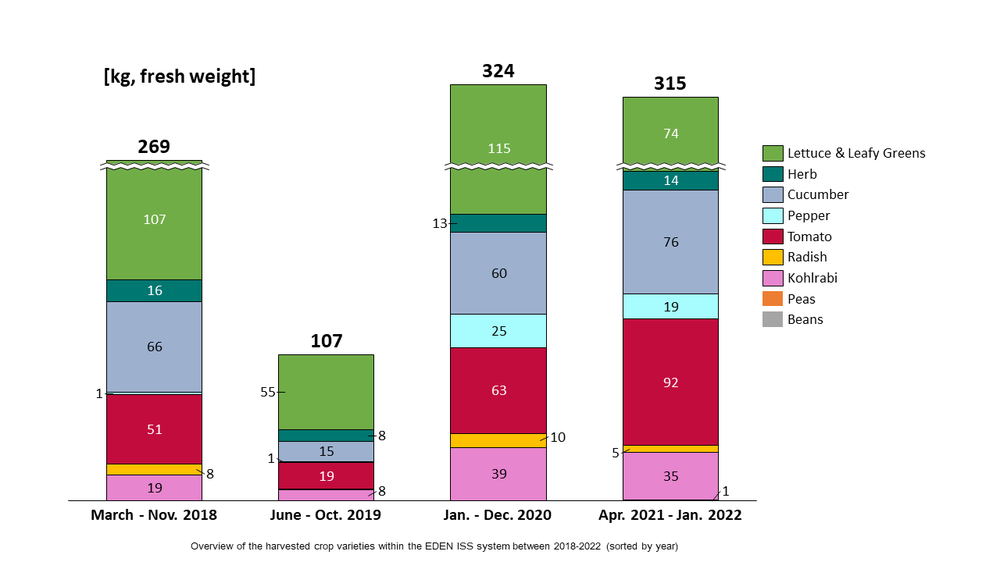
Overwintering teams appreciate fresh supplies
For four years, the EDEN ISS greenhouse provided fresh vegetables for the rotating overwintering crews and summer guests at Neumayer Station III. With a small overwintering crew and a long isolation period, Neumayer III is an excellent analogue environment to space for these kinds of studies. Antje Boetius, Director of the AWI explains: "Antarctica is the darkest, coldest and windiest continent on our planet. This is a great challenge for the people that work and live there, especially during the winter. The greenhouse has brought colour into the lives of our overwintering teams, as well as meals enriched by fresh vegetables and herbs. The research shows that plant life is good for people and innovations for growing vegetables in extreme habitats are relevant for the future. Antarctica is an ideal test area for this. We will continue to work with DLR on projects that benefit spaceflight, deep-sea and polar research, and thus society as a whole."
Conversion for the training of lunar astronauts
For the return journey from Antarctica, the EDEN ISS greenhouse had to be dismantled into its two separate containers and approximately 1000 individual components of the greenhouse circuit and the hydroponic plant cultivation system. The greenhouse is now being overhauled at the DLR site in Bremen, equipped with new technology and thus prepared for the training of future lunar astronauts. In the mid-2020s, the greenhouse is to be integrated into the newly constructed LUNA hall at DLR's Cologne site. "The EDEN LUNA greenhouse will become even more digital, networked and resource-saving with the conversion," explains Schubert. "In future, a robotic arm in the greenhouse will support and relieve the work of the astronauts undergoing training. Additional cameras and an AI-controlled greenhouse management system will optimise the monitoring of the plants and their care. In addition, the processing of urine as a nutrient solution will be integrated into the greenhouse cycle," Schubert continues.
Astronauts that will be travelling to the Moon are to be trained in the LUNA test and training facility at the DLR site in Cologne. Construction and commissioning are planned for the middle of this decade. The converted EDEN LUNA greenhouse will be integrated into this research facility. The LUNA test and training facility is a joint project of DLR and the European Space Agency (ESA), which operates the European Astronaut Centre (EAC) in Cologne. The DLR institutes of Space Systems, Data Science, Robotics and Mechatronics, and Aerospace Medicine are involved in the EDEN LUNA greenhouse project with various contributions.
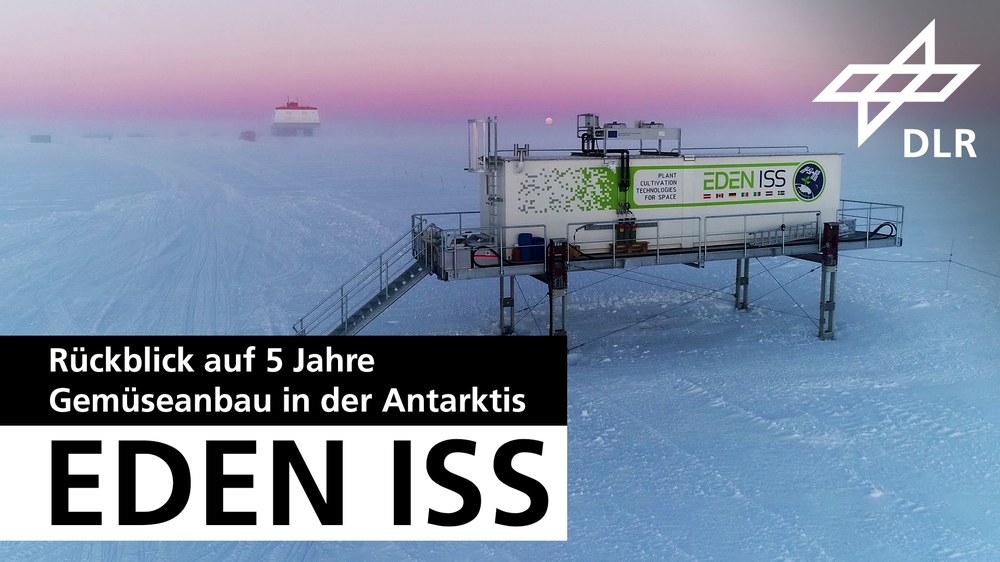
Video: EDEN ISS – a look back at five years of vegetable cultivation in Antarctica
Your consent to the storage of data ('cookies') is required for the playback of this video on Youtube.com. You can view and change your current data storage settings at any time under privacy.

